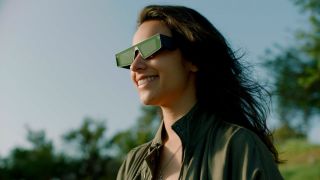Snap Spectacles 4
| Snap Spectacles 4 | |
|---|---|

| |
| Basic Info | |
| VR/AR | Augmented Reality |
| Type | Head-mounted display |
| Subtype | Standalone AR |
| Platform | Snap AR Platform |
| Developer | Snap Inc. |
| Manufacturer | Snap Inc. |
| Announcement Date | May 20, 2021 |
| Release Date | May 2021 (Developer-only) |
| Price | Not for sale (Developer program only) |
| Website | https://www.spectacles.com/ |
| Versions | Single version |
| Requires | Lens Studio, Compatible smartphone |
| Predecessor | Snap Spectacles 3 |
| Successor | Snap Spectacles 5 |
| System | |
| Operating System | Proprietary |
| Chipset | Qualcomm Snapdragon XR1 |
| CPU | Qualcomm Snapdragon XR1 |
| GPU | Integrated in XR1 |
| Storage | |
| SD Card Slot | No |
| Display | |
| Display | Dual 3D waveguide displays |
| Peak Brightness | Up to 2000 nits |
| Resolution | 480 x 564 per eye |
| Refresh Rate | 120 Hz |
| Image | |
| Field of View | 26.3° diagonal |
| Visible FoV | 26.3° diagonal |
| Foveated Rendering | No |
| Optics | |
| Optics | Waveguide |
| Ocularity | Binocular |
| Passthrough | Yes (via cameras) |
| Tracking | |
| Tracking | 6 DoF (Six degrees of freedom) |
| Base Stations | No (inside-out tracking) |
| Eye Tracking | No |
| Face Tracking | No |
| Hand Tracking | Yes |
| Body Tracking | No |
| Rotational Tracking | Yes |
| Positional Tracking | Yes |
| Latency | 15 millisecond motion-to-photon |
| Audio | |
| Audio | 2 stereo speakers |
| Microphone | 4 built-in microphones |
| 3.5mm Audio Jack | No |
| Camera | 2 RGB cameras |
| Connectivity | |
| Connectivity | Wi-Fi |
| Wired Video | No |
| Wireless Video | Yes |
| WiFi | Yes |
| Power | Rechargeable battery |
| Battery Life | 30 minutes active use |
| Device | |
| Weight | 134 grams |
| Headstrap | Temple arms (glasses style) |
| Haptics | No |
| Color | Black |
| Sensors | IMU, cameras for SLAM |
| Input | Touchpad, voice commands, hand tracking |
Introduction
The Snap Spectacles 4 (also known as fourth generation Spectacles) are augmented reality glasses developed by Snap Inc., announced on May 20, 2021, at the Snap Partner Summit. Unlike all previous generations which only featured cameras for capture, Spectacles 4 were Snap's first glasses to include actual AR displays, marking a significant milestone in the company's hardware evolution.[1]
These glasses were not made available for consumer purchase but were instead distributed exclusively to AR creators and developers as a development kit to build AR experiences using Lens Studio. Snap planned to send out approximately 1,000 units to selected developers who applied through their creator program.[1]
Development Philosophy
Snap took a "form-over-function" approach with Spectacles 4, prioritizing a wearable form factor that consumers would find reasonable over raw technical capabilities. This strategy contrasted with competitors like Microsoft HoloLens and Magic Leap, which traded bulkiness for greater capabilities.[1]
CEO Evan Spiegel described the glasses at launch: "Spectacles tap into our human senses of sight, touch, and sound to bring Lenses to life... Spectacles aren't for sale, they're for augmented reality creators to reimagine the way we communicate, live, and explore the world together through AR experiences built in Lens Studio."[2]
Hardware Specifications
Display Technology
- Display Type: Dual 3D waveguide displays[2]
- Resolution: 480 x 564 pixels per eye[3]
- Field of View: 26.3 degrees diagonal[2]
- Brightness: Dynamically adjusts up to 2000 nits for indoor/outdoor use[2]
- Refresh Rate: 120 Hz[3]
Processing and Performance
- Processor: Qualcomm Snapdragon XR1 Platform[2]
- Latency: 15 millisecond motion-to-photon latency[2]
- Operating System: Proprietary (pre-Snap OS)
Tracking and Interaction
- Spatial Tracking: 6 degrees of freedom (6DoF)[2]
- Hand Tracking: Yes, for gesture-based interactions[2]
- Tracking Technology: Snap Spatial Engine with:
- Hand tracking
- Marker tracking
- Surface tracking[2]
Cameras and Sensors
- RGB Cameras: 2 front-facing cameras for world mapping[4]
- Microphones: 4 built-in microphones[5]
- Sensors: IMU and cameras for SLAM (Simultaneous Localization and Mapping)[6]
Audio and Input
- Speakers: 2 stereo speakers[4]
- Input Methods:
- Touchpad on temple for navigation
- Voice commands via "Voice Scan"
- Hand gestures
- Physical buttons (left button for capturing Snaps, right button for Scan)[2]
Physical Characteristics
- Weight: 134 grams (significantly lighter than competitors like HoloLens)[2]
- Form Factor: Traditional glasses design
- Battery Life: Approximately 30 minutes of active use[1]
- Charging Case: Can hold up to 4 charges[1]
Software and Development
Lens Studio Integration
Developers could create AR experiences using Lens Studio, Snap's desktop application for building AR Lenses. Key features included:
- Wireless push of Lenses to Spectacles for rapid testing
- Real-time iteration capabilities
- Support for existing Lens Studio creators (250,000+ at launch)[4]
Interaction Paradigms
- Lens Carousel: Accessed via temple touchpad
- Scan: Right button activated contextual understanding to suggest relevant Lenses
- Voice Scan: Hands-free Lens launching via voice commands
- Snap Capture: Left button captured 10-second AR-enhanced videos[2]
Limitations and Compromises
The push for a lightweight form factor resulted in significant technical compromises:
- Limited Field of View: At 26.3 degrees, the FOV was notably narrow, requiring users to "hunt around the scene just to spot the content through the tiny window"[1]
- Short Battery Life: 30 minutes made them "feel more like a dedicated-use device than something you use because you just happen to be wearing it"[1]
- Display Limitations: Lower resolution compared to competitors
- Developer-Only: Not available for consumer purchase[5]
Launch Partners and Experiences
By December 2021, AR experiences available on the glasses included:
- A zombie chase game
- Pong game
- Solar System projection
- Interactive art pieces
- Connected Lenses allowing multiple Spectacles to interact when sharing Wi-Fi[4]
Notable creators given early access included:
- Don Allen Stevenson III - XR Developer - Vibe Quest AR
- Lauren Cason - Creative Technologist - Taos, Caldera, and Anita
- Kat V. Harris - Technical Designer - Dance Helper
- Zach Lieberman - Artist - Poem World (with Shantell Martin)[2]
Developer Program
Snap distributed Spectacles 4 through an application process:
- Developers could apply at the official Spectacles website
- Approximately 1,000 units planned for distribution
- No cost to selected developers
- Included support from Snap's team
- Required use of Lens Studio for development[1]
Reception and Impact
The announcement generated significant interest in the AR development community. Publications praised Snap for transparently showing the limited field of view in promotional materials, with Road to VR noting: "props to Snap for making an effort to show how limited the field-of-view is in its promotional materials."[1]
The glasses were seen as an important stepping stone toward consumer AR glasses, with Snap CEO Evan Spiegel demonstrating experiences like AR butterflies landing on his hand during the launch presentation.[6]
Legacy
Spectacles 4 marked several important milestones:
- First Snap Spectacles with AR displays
- Introduction of hand tracking and spatial computing
- Establishment of Snap as a serious player in AR hardware
- Foundation for the more advanced Spectacles 5 and Snap OS[4]
The developer feedback and lessons learned from this generation directly influenced the significant improvements seen in Spectacles 5, including expanded field of view, better battery life, and the introduction of Snap OS.
Images
See Also
- Snap Spectacles 3
- Snap Spectacles 5
- Lens Studio
- Augmented Reality
- Qualcomm Snapdragon XR1
- Waveguide Display
References
- ↑ 1.0 1.1 1.2 1.3 1.4 1.5 1.6 1.7 1.8 https://www.roadtovr.com/snapchat-spectacles-ar-glasses-announcement/
- ↑ 2.00 2.01 2.02 2.03 2.04 2.05 2.06 2.07 2.08 2.09 2.10 2.11 2.12 https://newsroom.snap.com/introducing-the-next-generation-of-spectacles
- ↑ 3.0 3.1 https://vr-compare.com/headset/snapspectacles(2021)
- ↑ 4.0 4.1 4.2 4.3 4.4 https://en.wikipedia.org/wiki/Spectacles_(product)
- ↑ 5.0 5.1 https://variety.com/2021/digital/news/snap-spectacles-augmented-reality-glasses-1234977851/
- ↑ 6.0 6.1 https://newatlas.com/wearables/snapchat-ar-spectacles-2021/




